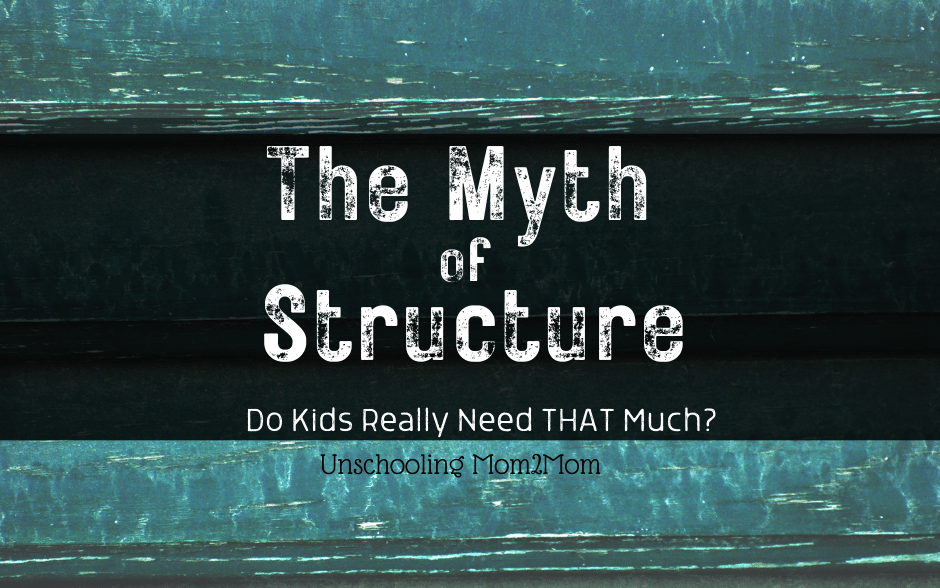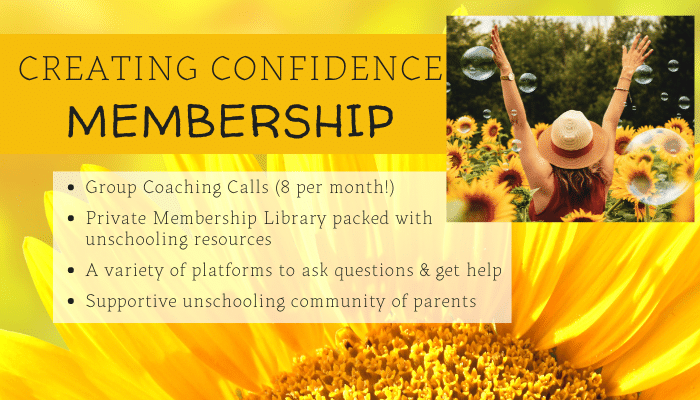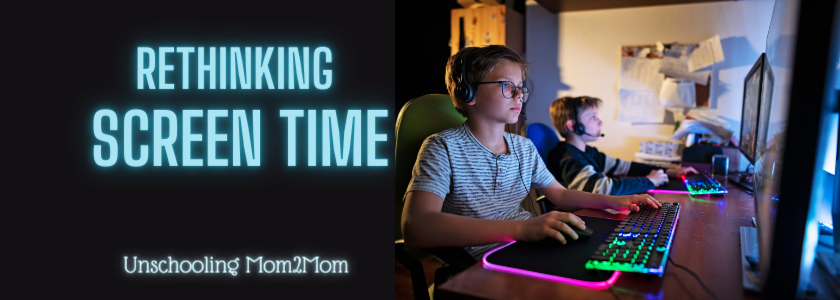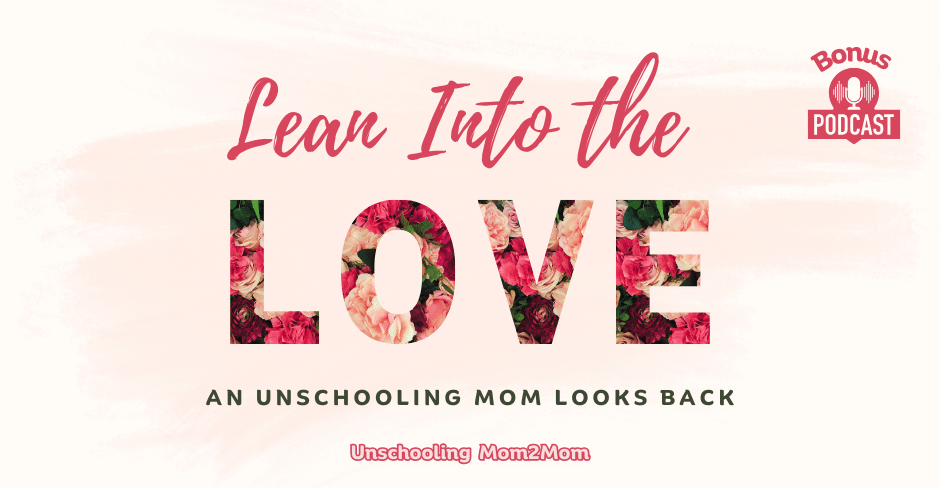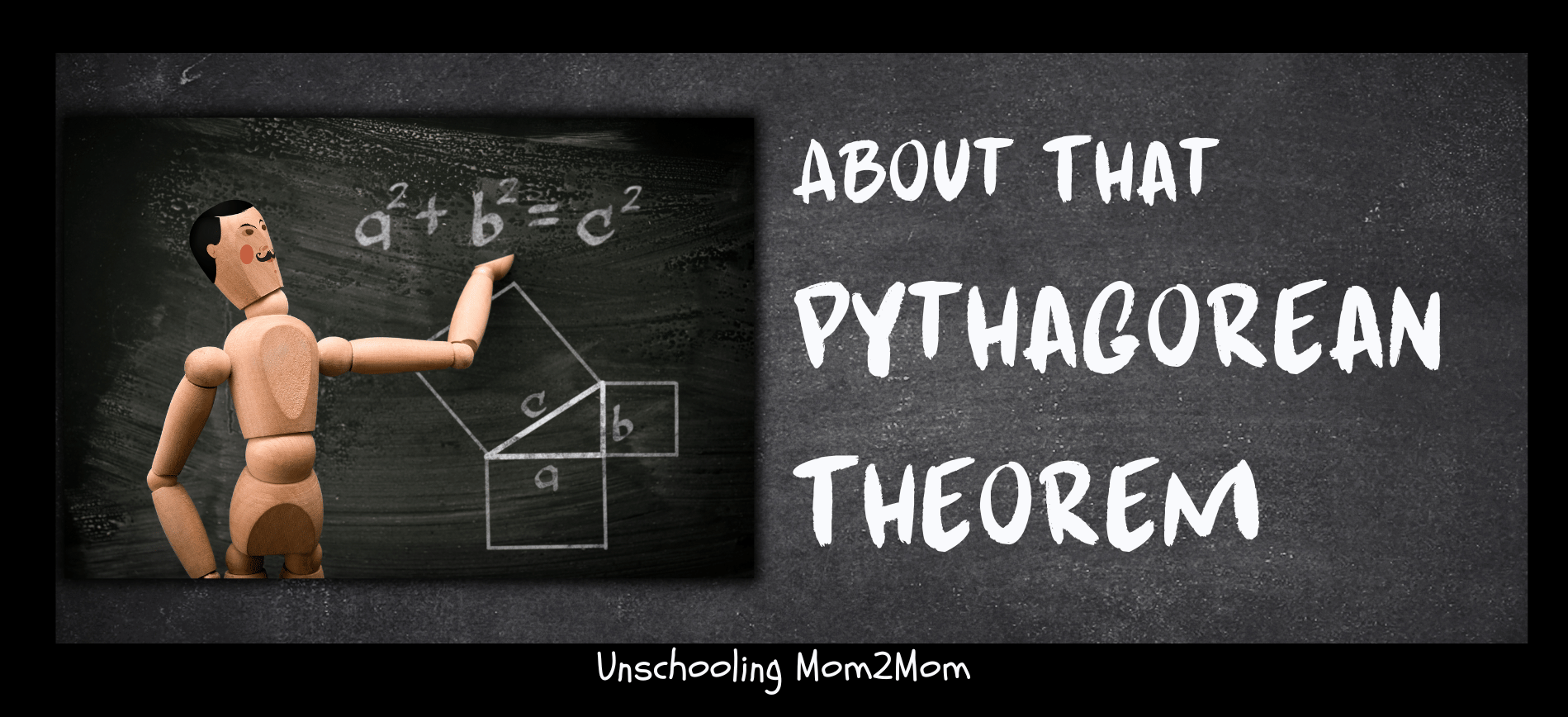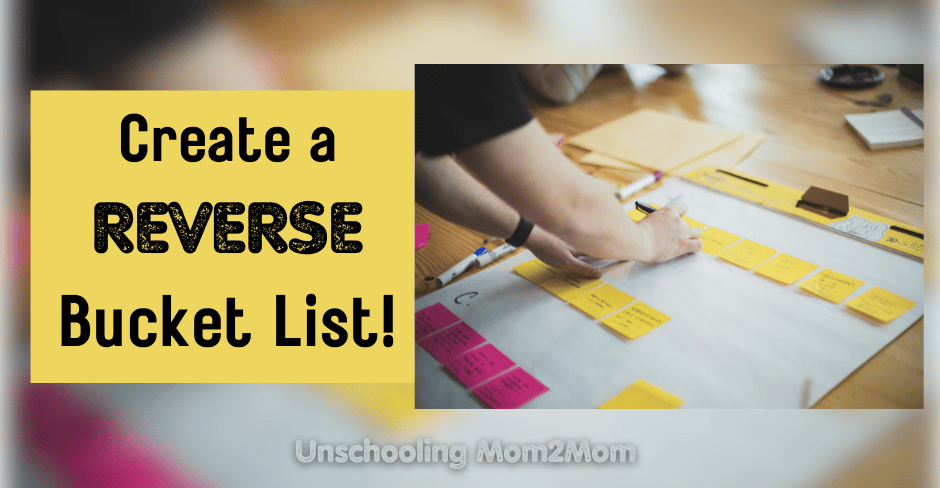The Myth of Structure
Structure is another one of those words that gets misused. People say that kids need structure – and then take it too far. Kids don’t need their whole lives structured. There’s no room for curiosity or following an interest if you do that. They don’t need their learning structured for exactly that same reason. It’s not conducive to real learning if you say “We do Math at 10, Social Studies at 11, Lunch at noon, etc.” What happens when something wonderful presents itself in the middle of your schedule? Or if they are more interested in watching the Presidential debates? Or wondering why leaves are turning colors in Vermont, but temps are still in the 90s in Texas?
Life brings structure – winding down for bedtimes, making it on time and prepared for soccer practice twice a week, showing up for park days with blankets, chairs, snacks and water bottles, getting to the post office before it closes. But also, identifying priorities, knowing what’s going to happen that day, being clear on expectations… these are forms of structure.
So I don’t say “No structure ever!” That would be silly.
Structure is all around us. We don’t have to create arbitrary structures though.
If you’re still thinking that kids thrive with structure, ask yourself why?
Some of your own responses will be totally logical. Others may leave you with more questions than answers.
Why the push for structure?
What answers do you get when you ask yourself, “Who says?” and “Why?”
Sometimes, it’s the adults seeking the structure for themselves. It’s about getting a handle on the fear that comes when things are a little more floaty than we’re comfortable with. We quickly want to clamp down and create some order.
Instead, it might be helpful to sit with the discomfort you have with that lack of structure.
Just be a watcher.
What’s happening? Why do
you need the structure?
If you’re afraid that a little chaos will definitely lead your family into total bedlam and anarchy, try to get that disaster mindset in check. A little disarray is not the same as a complete pandemonium. Try to stay realistic on what is actually happening in the here and now.
Or maybe you've always swooped in to manage the situation - and you've never given your kids the chance to figure out what their own next steps could be. That puts more work on you and ends up circumventing the opportunity for your child to learn a little more about themselves and how to manage their world.
A Solution for YOU
If you have a hard time overcoming those thoughts and you’re still thinking that you’d like to provide more structure, create it for yourself. Start a bullet journal or Evernote system and get your thoughts all organized. Nothing wrong with doing that at all. Just don’t take it that step further and decide that everyone else in your house needs your structure.
Everyone Says It
When you hear people talk about how “kids need structure,” consider how they might simply be using a cliché to promote the status quo. Learning doesn’t have to be parceled out to kids under some guise of needing structure.
Stay Flexible
While some kids need a little more structure based on their temperament or developmental phase, try creating structure individually without sweeping with a broad brush. And be ready to change it, if the situation doesn’t call for it.
Of course, you have to provide safety – and structure does that. And sometimes kids need help with transitioning from one activity to another. Structure can help with this too. But keep in mind that the less “imposed” structure, the better. A child will be much more likely to learn how to do this for themselves if you can refrain from being heavy-handed in the structure department.
No one likes someone imposing a structure on them - it's far better to partner with your child and figure out what could keep everyone (mostly) happy. It's not about "giving in" to your child, as many mainstream responses would tell you. It's more about avoiding unnecessary power struggles, helping them see how to navigate their environment, and trusting that they can help solve the problem.
Read More...
Structure, Schedules... and Unschooling?
Sometimes we need to think about some of these concepts a little more. I did a podcast you can listen to and the transcript (with more resource links) is here at the button.

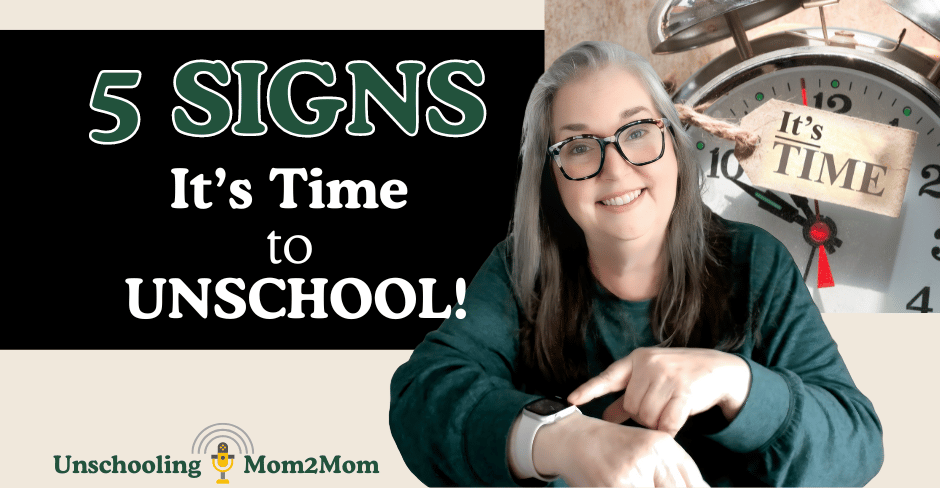

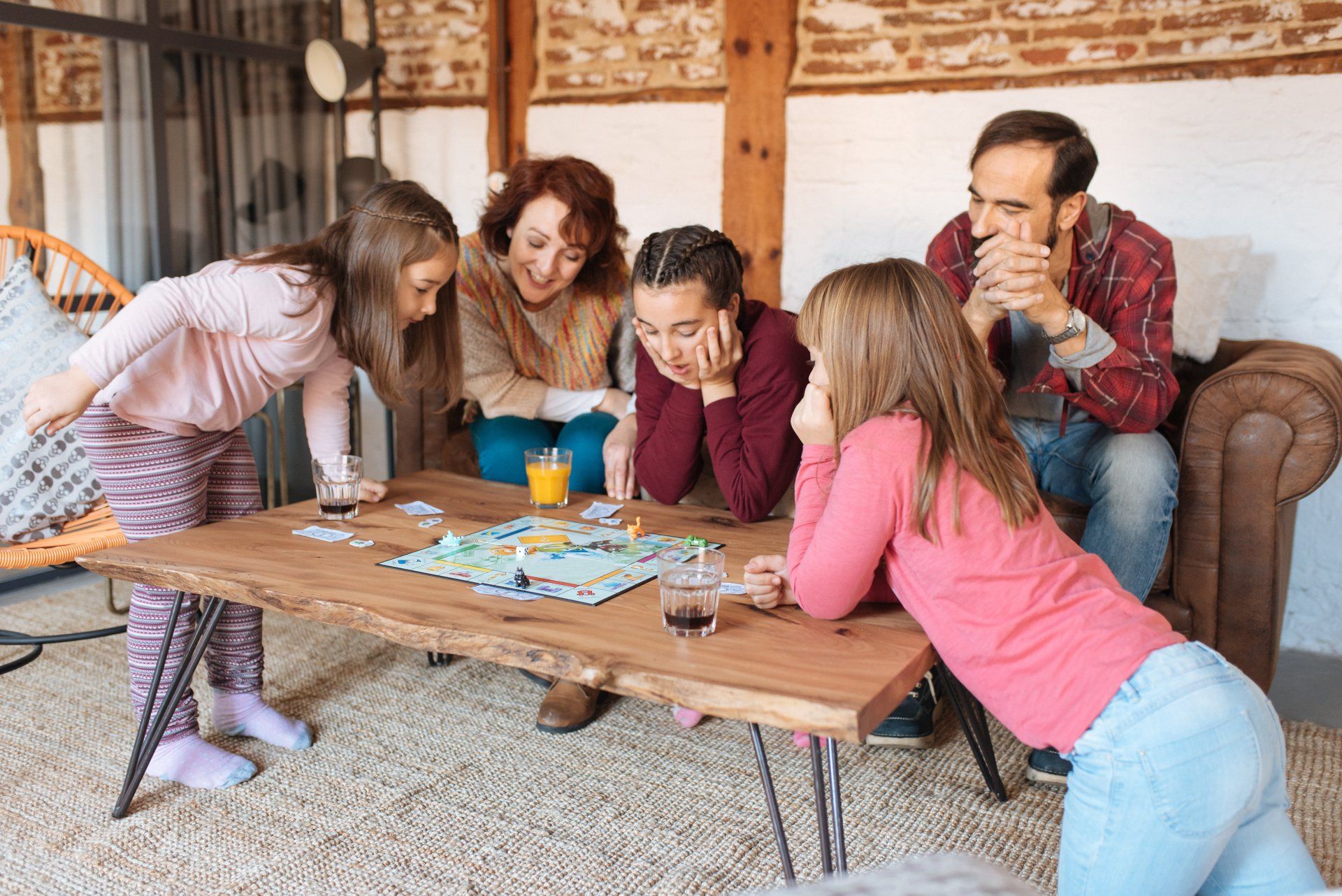
-
🤗💖 Deschooling can be a time for exploration and fun! Take a look at my list of activities that will help you and your kids create lasting memories as you break from from the school model of learning. Don't worry, subjects weave through all these activities. As time goes on, you'll be able to see that more clearly! 365 Fun activity topics include: ✨ Game-Related ✨ Cooking-Related ✨ Stress Relief ✨ Science Fun ✨ Fun Around the Home ✨ Creativity ✨ Technology-related ✨ Solo Activities ✨ Family Activities ✨ Community Activities ✨ Thinking of Others This list will help you through any "creativity slump!" you might have. Put #365 in the comments and I'll send you the link so you can find out more about this! Let's make this time an unforgettable experience and a fabulous transition into unschooling! #unschoolingmom2mom🌻Button
-
💥 And Today!!! 🎊 My first baby turns 35! 🎉 How that's even possible when I still think of him as running around the house with his dinosaurs or cutting and taping a million contraptions. 🦕✂️🌪 Our little Mikey! 💙 @michael_the_wolfe , I'm so proud of you! I love how you've built your life exactly how you want it. 💞 You should be really proud of yourself and your ability to see the world as yet-another-thing-to explore! 🔭 I love how you approach everything as an adventure! 🌎 🗺 🧭 🥾 🥳 35 times around the sun 🌞 and you're packing it in! 🎒 Just like I knew you would. I'm glad you made it home in time to celebrate your birthday with Kathya! ✈️ 🥰 I'll bring a chocolate pie up to you soon! 🥧 🍫 HAPPY BIRTHDAY!!! We love you! 🎂 🎁 🥳 🎈🎉 P.S. Celebrated you on FB, now over here on IG too! #unschoolingmom2mom🌻Button
-
🎓🌟 Struggling to see the educational value in everyday activities? Our Everything Counts eBook is here to guide you! 📚💡 EVERYTHING Really DOES Count! ✔️ This Everything Counts ebook offers a little coaching and then shows you how to find familiar subjects weaving throughout daily activities. So many examples - this is going to put your mind at ease! 💛 Put #Everything in the comments and I'll get the link over to you asap!Button
-
Who needs this today? Remind your friends! YOU HAVE PERMISSION to… 👣 Follow each child’s unique path. 🧠Count everything toward learning. 🛝 Play during “school hours.” 😴Sleep whenever they are tired. 🗺️Use Life Experiences as Curriculum Slow down, speed up, stay home, go out. You had permission all along! What are you going to do today??? Seriously- tell me! Share the fun! #unschoolingmom2mom🌻 #unschooledlife #unschoolersofinstagramButton
-
Historically, humans don't do well with progress. Learning to read was no exception! If you need to find a way to help your child develop skills in reading, the Unschooling Guide: Learn to Read would be a great choice. Or if you're worrying about "too much technology" - in spite of the whole world moving in that direction - the Unschooling Guide: Technology will really help you! Lots of practical advice and tips in both! Put #TechGuide in the comments below for the link. Put #LearntoRead in the comments if you're looking for more help with reading. You don't have to figure this all out by yourself! #UnschoolingMom2Mom🌻Button
-
🎙New Podcast ⬇ Finding Your People - How DO Unschoolers Find Each Other? 🔎 👀 Are you having trouble finding other unschooling families? Or maybe you’d just like to find people who don’t want to talk about curriculum all the time? This week, I'm sharing 5 ways you can find the people who are going to make this unschooling journey more enjoyable. It's so great to find others who are also working their way through their fears, deschooling their old ideas, and embracing a better life for their own family. For me, this was how I was successful unschooling my own three kids. And I want to share what worked for us - I think it will help you too! Put #NewPodcast in the comments below and I'll send you the link to listen! #unschoolingmom2mom🌻 #unschoolingmom2mompodcastButton
-
So true! 👀Button
-
Sometimes BIG changes can come when parents shift how we say things! Changing the phrasing can strengthen the connection between you and your child AND shift your mindset away from being so panicky all the time! The Left column: 🚫 Fear based 🚫 Influenced by YOUR peers 🚫 Historically typical as adults often mistrust the changes that come with progress The Right Column: 💛 Shows kids you value their choices (which they interpret as valuing THEM) 💛 Flips the same behaviors to a more positive interpretation Try it! And let me know what changes you see! (This comes from the March Technology Challenge in my Membership Group!) Reach out if you have questions! #unschoolingmom2mom🌻Button
-
✨I'd love to get you the unschooling support you need! 🤗🎉 Imagine how awesome it would be to have other parents around you, brainstorming and sharing ideas - and me, sharing nearly 30 years of seeing what works and what doesn't in the homeschooling and unschooling communities. 💞💞💞 Everyone is different - I can help you figure out what will work best for you and your family! 🏡 🙌 So many resources! So much support! 💥 Why do this alone?🤷🏻♀️😃 ↓ Put #Membership in the comments below and I'll get the link over to you in the DMs. 👀 💛 #unschoolingmom2mom🌻 #unschoolingmom2momButton
-
🌟 Time to Break Free from Traditional Schooling? 🌟 Our kids deserve more than the status quo! Whether you've had enough of the school system or that school-at-home approach to homeschooling just isn't working - let me help you find another way! 🚀 🌟 Wouldn't it be nice to talk to someone who's unschooled her own kids? 🌟 How about if they're grown, got into college, own homes and businesses? 🌟 What if you could talk to someone about what's keeping you up at night, worrying about your kids? You're in the right place because that's exactly what I do! After nearly 30 years, I know what works and what doesn't. 💡 I can help you separate the facts from the myths so you can create a truly INDIVIDUALIZED approach to learning and living with your kids. Sometimes it only takes one phone call. ☎️ Get answers to the questions that worry you. ☎️ Create a quick strategy to dealing with the obstacles you have. ☎️ Leave with a sigh of relief because there really IS an alternative! Other parents want ongoing 1:1 help, we can do that too: ✔️ Check in by phone periodically - weekly or monthly ✔️ Create a detailed strategy to overcome obstacles ✔️ Have your own private Unschooling Personal Trainer! 🏋️♀️ ✔️ Bring questions each time and I'll help tailor the advice to create a unique unschooling path that fits your kids, your family, your goals, and your learning style. I want to help you embrace a lifestyle and an educational path that really works! And it doesn't have to look like school at all! 📱 Let's talk! 🗓 Hop on the calendar - you can get the link in the bio or Put #coaching in the comments below and I'll get the link over to you in a DM. 💛 #unschoolingmom2mom🌻Button
-
Are you celebrating Pi Day? 🥧 Or are you into it but the kids aren’t? 🤷♀️ That’s what I’m talking about on the podcast this week - but I just made a video about it too. 🎙️🎥 I have to admit, I’m a little too excited by my opportunity to put in so many memes! 😂 Let me know what you think of it. 🗣️ And if you want the link to the video, put #PiVideo in the comments and I’ll get you the link! #unschoolingmom2mom🌻 #unschoolingpodcastButton
-
🎥 New Video Today! Let's do a Reality Check on Pi Day! 😉 🥧🍒🥧🫐🥧🍫🥧 I'd love to hear what you think of today's video - I may have gone overboard on my love of memes! What do you think? Also... are you making pies today? Or are you over it? Put #PiVideo in the comments below and I'll send you the link! #unschoolingmom2mom🌻 #pidayButton
-
I know. You KNOW!😂 I've been reminding you for a week! But there are even MORE reasons to celebrate every day than this! Each month, we create a printable calendar with a different idea for each day of the month! And then on Sundays, I send out an email with EXTRA ideas for each of the upcoming days in the week ahead, including links so you don't have to go looking around for the info! This is such a great tool for helping kids expand their world a little! Some families print the calendar and then have the kids circle the days they don't want to miss.... like Parfaits for Breakfast 🍨or Dolphin Day! 🐬 At only $5/month (less if you buy the annual subscription) - this is a FABULOUS deal! Put #calendar in the comments below and we'll get the link over to you in DM. And hop over to the blog for more resources to help you celebrate Pi Day Today! Put #PiDay in the comments for the link. #unschoolingmom2mom🌻Button
-
"Self-education is, I firmly believe, the only kind of education there is." ~ Isaac Asimov Deschooling Society #deschooling🌻#unschoolingmom2momButton
-
Pi Day is in a couple of days... Maybe you need some suggestions for yummy ways to mention it to the kids! If you're looking for funny memes about Pi Day, I have a blogpost with over 85!!! I won't deluge you here! But you can access it and share it with the kids. I can send the link if you put #PiDay in the comments below. #unschoolingmom2mom.com🌻Button
-
🎥 NEW VIDEO UP! 🎥 About That Term: Screen Time How are you feeling about your kids and their technology these days? 😬 After the Technology Webinar on the 1st, I realized I hadn't addressed this aspect of the topic! So, here's a little 6-ish minute video I made for you. Let me know what you think. You can hop over to YouTube and find me at... Unschooling Mom2Mom. Or put #Videolink in the comments below and I'll DM it over to you! P.S. I'm trying to drive up my "watch time" on YouTube so I can embed links in the video. It really helps me if you watch the videos, leave comments, click on other videos that I've done - you know, all the things! Just thought I'd let you know. 😉 #unschoolingmom2mom🌻Button
-
This week was National Sons Day and I missed it! Love you, Mikey!! 💖 @michael_the_wolfe @minipaintadventure #unschoolingmom2mom🌻Button
-
TECHNOLOGY! and Unschooling! 😬 How do we figure out how to manage our days? Get this Guide to learn how to stop the power struggles and overcome your fears about technology! ➡ Discover what they're learning. ➡ Reframe tense situations ➡ Answers to your questions As parents, we make a lot of mistakes when it comes to helping our kids learn to navigate this technology. Learn what little changes you could do to make a huge difference! Put #TechGuide in the comments and I'll get the link to this Unschooling Guide over to you in your DM. #unschoolingmom2mom🌻Button
-
Ready for the March Unschooling Question of the Month? It's the topic everyone is worried about - KIDS & TECHNOLOGY! 💻 📱 🎮 🕹 ⌨️ 🖥 It's up at YouTube now! 🎥 If you're on my email list, you'll have the link for the recording and the Free PDF I made to go with it! 🙋🏻♀️ If not, put #webinar in the comments below, and I'll send links to you through DM. 💌 #unschoolingmom2mom🌻Button
-
Nothing like a Meta hiccup to remind us that we're all on rented land here! 😳 Whether various social media platforms come or go, your unschooling (or even almost-unschooling) journey continues on, right? 👣 And knowing that life, learning and parenting is kind of a roller coaster🎢you'll need support along the way. Sometimes more, sometimes less. ⚖️ I don't expect everyone to join my membership group for the hand-holding from me and community support from other unschooling parents... 💞 But I DO want you to be successful at unschooling. 💪 AND, I know that there's such a push toward status quo, conforming, getting curriculum, and doing what's familiar. 😖 📚 🏫 💌 I want to offer this free email list to you so you have a lifeline when you need encouragement. 🛟 And today's little Meta glitch, reminded me that we may only be connected over here. 🤷🏼♀️ 🙋🏻♀️ Put #email in the comments below and I'll send you the link to sign up for my free emails. 💌 1-2 emails per week - no biggie! 💁🏼♀️ #unschoolingmom2mom🌻Button
-
New Podcast Up Today! I have some ideas and strategies to help you if you're worrying about your kids on their devices. Put #PodcastTech in the comments below and I'll send you the link to listen! #unschoolingmom2mom🌻Button
-
March is here! 🍀 🎨 Could your creativity use a boost? ⏰ Maybe a *little* structure in your learning? 🗓 This calendar works for kids (and adults!) of all ages! It's simply a celebration for every day of the month. ✨It's a perfect example of how the learning and fun all weave together! The calendar focuses on one topic each day and we'll send you links to help you dive deeper! 👩🏼🏫 Relaxed homeschoolers who aren't ready to unschool find the ideas perfect and love the private portal with subjects identified for every day! 🙋🏻♀️ Parents still knee-deep in deschooling will appreciate the private webpages that show all the subjects that are associated with each celebration. (I'm determined to help you all see through this unschooling lens! The learning is there - we just have to notice it!) Only $5/month! 👀 💥 Available in 6-month and 12-month subscriptions 💥 INCLUDED in the Creating Confidence Membership. 💥 1 month free when you purchase the Jumping Into Unschooling Course Perfect for families who are feeling disconnected or wondering if they're doing enough, Life DOES provide so many opportunities to learn! 🤔 👇Put #calendar into the comments and we'll get you the info over to you. #unschoolingmom2mom🌻 #unschoolingmom2momButton
-
🗓 Unschooling Question of the Month! ❓ Tomorrow - March 1st! 1 PM CENTRAL And everyone's favorite topic: TECHNOLOGY! 💻 🤳🏼 What are you afraid of? 😬 Send me the questions you have and we'll try to get to them all. ⬇️ Some I've received so far: 🙋🏻♀️ "How can unschoolers say 'no limits' to screentime?" 🙋🏼♂️ "What if that's all they want to do?" 🙋🏻♀️ "Aren't you worried that they need more BALANCE in their lives?" 🙋🏼♂️ "What happens when *I* can't stand their games?" 🙋🏻♀️ "What about dopamine addiction or dysregulation???" What would you add? We'll have another free PDF handout for you at the webinar - and yes, if you register but can't make it, I'll send you the links to the recording and the PDF. Put #MarchQuestionin the comments below and we'll send you the Registration link via DMs.Button
-
📚🔒 If unschooling your teen makes you nervous, don't worry! The Unschooling Teen Toolkit has got you covered! 🎉 Get all the resources you need to make unschooling a success for you and your teen. 🤩 You really don't have to duplicate school! 🔸Unschooled teens get into college. 🔸Unschooled teens are exploring their interests and curiosities. 🔸Unschooled teens are learning life skills they'll really need as adults. 🔸Unschooled teens are getting enough rest. 🔸Unschooled teens are finding joy again in the process of learning! If you're wondering how this can be, you'll want this Unschooling Teens Toolkit. It will give you the answers - and the directions - you're looking for! 6 Ebooks/PDFs included: ✔️Homeschooled Teens: 75 Young People Speak about Life without School ✔️Everything Counts ✔️Unschooling Your Teen ✔️120 Life Skills for Transitioning into Adulthood ✔️75 Ways to Connect with Your Teen ✔️Creating a Transcript Workbook Reach out if you need more help - you don't have to do this alone. Put #Toolkit in the comments below and I'll send you the link. #UnschoolingMom2Mom🌻 #homeschooledteens #homeschoolingteens #unschooledteens #parentingteens #parentingteenssolutions #parentproblems #parentingsolutions #parentsoftweensandteens #unschoolingmom #unschoolingmom2mom #homeschoolingmom #unschoolinglife #unschoollife #unschoolers #unschooling #unschooled #homeschoolmom #homeschool #HomeschoolingButton
-
🎉🎂 Happy Birthday to my incredible middle child, Katie! 🎂🎉 Today, we’re celebrating from afar! But I know you’ll enjoy your traditional Birthday Breakfast of cream puffs and raspberries! (PLUS Pancakes -because it’s the celebration of the day! 🥞) I wish I could be there with you!!!! 🥰 I’ve loved seeing your Birthday week filled with fun! 💞🪓 You are NOT forgotten as the middle child! I promise! 🥰 You are cherished more than you could possibly even know! Your heart is so big, filled with love, empathy, and endless kindness for anyone in your path. 💖 I want to let you know how proud Dad and I are of you, out there pursuing your dreams with unwavering dedication and persistence! Your talent knows no bounds and I’m excited to see where your journey in the acting world takes you next. 🌎💫 May your birthday today be filled with love, laughter, and fun! 💖😂🎉😹 Here's to another year of countless blessings, success, and joy! 🌟 Happy Birthday, Katie! @actorkatiep 🎈🎁Button
-
🗓 Unschooling Question of the Month! ❓ Friday - March 1st! 1 PM CENTRAL And everyone's favorite topic: TECHNOLOGY! 💻 🤳🏼 What are you afraid of? 😬 Send me the questions you have and we'll try to get to them all. ⬇️ Some I've received so far: 🙋🏻♀️ "How can unschoolers say 'no limits' to screentime?" 🙋🏼♂️ "What if that's all they want to do?" 🙋🏻♀️ "Aren't you worried that they need more BALANCE in their lives?" 🙋🏼♂️ "What happens when *I* can't stand their games?" 🙋🏻♀️ "What about dopamine addiction or dysregulation???" What would you add? We'll have another free PDF handout for you at the webinar - and yes, if you register but can't make it, I'll send you the links to the recording and the PDF. Put #MarchQuestionin the comments below and we'll send you the Registration link via DMs.Button
-
Truth! 🧦 #UnschoolingMom2Mom🌻 #UnschoolingMom2MomButton
-
"There is always light, if only we're brave enough to see it. If only we're brave enough to be it." Amanda Gorman wrote and shared this but she could have easily been talking about unschooling parents! It can be tough to choose something different. It DOES take some bravery. But you can do it! And you have an entire unschooling community around you here to help you along! Reach out if you need more help from me! #unschoolingmom2mom🌻Button
-
Hard to believe, but 30 years ago today, the world and I welcome my baby, Alyssa Jane. 🎈✨ Time has flown by. ⌚ I am so immensely proud of the person you've become, not just as my daughter, but as a compassionate, driven, and kind-hearted individual. 💖 From the moment you came into this world - like a rocket 🚀👶🏼 - you've continued to propel yourself forward at the fastest pace possible, leaving a trail of brilliance in your wake.💫 I’m often astounded at all you’ve accomplished - before even turning 30! Most of all, though, I’m so proud of how you mother Jackson - for nearly 9 years now! So patient, understanding and protective (Mama Bear level of protection - it’s the Alaskan in you!🐻 ) This fills my heart with immense joy. 💕 This past decade has shown how you’ve faced challenges head-on, embraced opportunities with open arms, and emerged stronger and wiser with each passing day. It's inspiring to watch you show the world that you're capable of achieving anything you set your mind to. 💪🌟 So here's to bidding farewell to the past and embracing the future with open arms. 🤗💖 May your thirties be filled with boundless opportunities, endless adventures, and an abundance of joy, love, and success. Your dad and I will be here to cheer you on every step of the way. 🎊💞 See you at the airport! 🏝️🛬 @lyssa.janee @theblonde.ish #unschoolingmom2mom🌻 #turning30isntsobadButton
-
Can you relate? Do you have any good suggestions? Let it go? 🎶 #UnschoolingMom2Mom🌻Button
-
The Unschooling Question of the Month for March (next week!) is TECHNOLOGY! Truth is, that unlocks a lot of questions - so let me know in the comments below - what do YOU want to talk about? Limits/No limits? 🚫 Cost/benefits? ⚖️ Power struggles? 💪 Dealing with judgement? 😬 Addiction? 😵💫 🤷♀️🤷🏼♂️🤷♀️🤷🏼♂️🤷♀️ #unschoolingmom2mom🌻Button
-
Are you ready to jump into unschooling but you're wishing someone could hold your hand a little bit? 🤝 🙋♀️ I can do that for you! 💛 Here's my course to ease you into unschooling through videos, links, PDFs - even bonus books and guides. 📚🎦📝 This step-by-step approach will help you create the foundation you need to be successful at unschooling. 1️⃣2️⃣3️⃣4️⃣ Imagine how many missteps you can avoid when you have someone walking along with you on these early steps!😅 I'm excited for you to begin your unschooling adventure! Let's do this - TOGETHER! 💞 Read more at the website and sign up today! ✅ Put #TheCourse in the comments below ⬇️ and I'll send the link over to you in DMs. 📩 #unschoolingmom2mom🌻Button
-
💡Be more of a Tour Guide than a School Teacher! The world is full of so many opportunities to explore! 🌎 Plan “Field Trips” not “Lesson Plans” 🚗🗺️ What fun things are you making time for? 🤿🎯🎳🧩🎮⛺️🍿🎥📚 #unschoolingmom2mom🌻Button
-
One day only!!! 🎊 It’s my birthday 🎂- so let’s have a FLASH SALE! 💥 Special deal for getting into my membership! Save nearly $150 on the annual membership! The current annual membership is a great deal - but today even better! You’ll get 6 months for the price of 12!!! 🙌🏼🥰🤑 But it’s over at midnight! New, current, & returning membership people - anyone can access this! Put #BirthdayDeal in the comments and I’ll DM the link to you!!! #unschoolingmom2mom🌻Button
-
Living our best lives, right?😄 And if you're not - you could be! ✔️ Choosing to unschool makes room for being comfortable in your own skin - your kids AND you. 💞 Imagine what it could be like to have COMFY DAY every day? 🤗 Oh! And if you didn't KNOW it was Comfy Day, you should subscribe to our Strewing Calendars! 🗓️ We let you know something fun for every day of the week! ☀️ Put #calendar in the comments below and I'll send you a link in DMs with more info. #unschoolingmom2mom🌻 #strewingButton
-
🎂 Today is My Birthday! 🎉 💓💓And because my all-time favorite thing in my coaching business is my Creating Confidence Membership group, I want to offer a ONE DAY ONLY deal! 💓💓 I just thought of this yesterday, so there's no big "launch" or Business "roll-out" kind of thing. (I never know how to do those anyway! lol) 🤦♀️ Normally, the membership is $49/month. You can get 2 months free when you buy the annual package. 😲👏 🎉 BUT TODAY! To Celebrate!🎉 I'm offering something even better! 🙌🙌 You can get into the membership group for a YEAR for only $348. That's only $29/month! 😲🫶 I have parents in there since 2016 - so it's worth it! 💞 And - you deserve the support! 🤗 Unschooling is (obviously) not "the norm." Lots of external push-back and internal fears can make it harder than it ought to be. But all that is SOO much better when you're in this group with my FABULOUS unschooling community. So many resources, so much support! 💞 🙋♀️So if you've been thinking about it, today's the day! I've never done this before and - I'd LOVE to see you in there with us! 💝💖🥰 💥24 Hour Flash Sale! 💥 ⬇️ Put #BirthdayDeal in the comments below and I'll send you the special link. 💌 #unschoolingmom2mom🌻Button
-
Listen to Oprah! Make the choices you need to make because it's BEST for YOUR kids and family - not because other people say you need to do what they do. Do you have trouble with this? Other people trying to "write your script" for you? I seemed to have that more when I was younger - probably because I was often asking for feedback/direction! It's interesting because, after all those years in school, I was USED to other people telling me what to do - no wonder I felt unsure of my self. But as you get older - and the more you do it - the more your confidence grows, right? I really am curious about your experiences with this. Tell me in the comments!Button
-
Are you tired of the same old math struggles? It's time to try something new! I'm sharing all the "secrets" of how unschooled kids learn math without a curriculum, a scope and sequence or a lesson plan! Take this course and you'll be able to shift your perspective on math - and help the kids do the same! You'll be so glad you did! Put #unschoolingmath in the comments below and I'll get the link to more info over to you in DMs! #unschoolingmom2mom🌻 #unschoolingmom2mom #unschoolmath #homeschoolmath #EverydayMathButton
-
Not everyone likes Valentine's day, but this is a day EVERYONE can enjoy. 😊 Have you grabbed your discount chocolate? What's your favorite brand? Let's do a Poll! 🍫 Which do you prefer: 🖤 Dark Chocolate 🤎 Milk Chocolate 🤍 White Chocolate ↓ Tell me in the comments. I'm not a huge white chocolate fan. 🤷🏼♀️Button
-
📚 Worried about Unschooling Your Teen? 🤔 Sue Patterson's book has got you covered! 🌟 Discover all the answers to your burning questions as Sue dives deep into the world of teenagers who didn't go to school. She addresses all the concerns parents often have. 🔍 How will they learn what they need? 🔍 How will they make friends? 🔍 Will they get into college? 🎉 Find out about the experiences of 75 young people who have walked this path, answering 25 critical questions just like these. 🗣️ They share firsthand what their lives were like, embracing this unconventional approach to education. 💬 Get inspired by their stories and gain valuable insights directly from those who have lived it! 📖 Homeschooled Teens has the reassurance you're looking for! You really don't have to switch over to the familiar school approach! Put #Book in the comments and I'll DM the link over to you to read more about the questions as well as see all the testimonials and endorsements - and GET THIS BOOK! #unschoolingmom2mom🌻Button
-
So... I did a thing... 😁 ⏰ Last minute. 🎙Bonus Podcast. I found something I had written for the Unschooling Blog Carnival back in 2012. I've edited it a little and I think you'll find it really inspiring. 💝 Think of it as my little Valentine gift for you! Listen at any of your favorite platforms - and you know I'm still trying to drive up my YouTube numbers so it's over there too. (I'll get more bells and whistles when I hit 3K watch time hours - so you know I'm all about that!) Anyhoo... Put #Bonus in the comments below and I'll dm the link to you!. You can also read it at the Unschooling Mom2Mom blog. It's all linked in the bio. ❤️ ❤️ ❤️Remember this one thing... it all boils down to Fear or Love. Everything. Let's try to move more to Love - I can help you if you're struggling. xoxo, Sue #unschoolingmom2mom🌻 #unschoolingmom2mompodcastButton
-
❣️ Just wanted to pop in to wish you a happy Valentine's Day! Hope your day is filled with love!❌ ⭕️Button
-
🎙 New Unschooling Mom2Mom Podcast this week! ♥️ Valentine's Day is just around the corner! And how doe that relate to unschooling, you ask? That's what I'm talking about in this week's Unschooling Mom2Mom podcast! Here's your weekly peptalk to help you connect more with your kids and show them awesome ways to learn! 😍 💝 Get activity ideas at the blogpost! 💝 Put #Valentine in the comments below and I'll send you the link to listen! https://youtu.be/NxdGoFpJiKA?si=GhXxmrFeUjPJz-0qButton
-
🎙 New Unschooling Mom2Mom Podcast this week! ♥️ Valentine's Day is just around the corner! And how doe that relate to unschooling, you ask? That's what I'm talking about in this week's Unschooling Mom2Mom podcast! Here's your weekly peptalk to help you connect more with your kids and show them awesome ways to learn! 😍 💝 Get activity ideas at the blogpost! 💝 Put #Valentine in the comments below and I'll send you the link to listen! #unschoolingmom2mom🌻 #unschoolingmom2mompodcastButton
-
Keep Learning!!! We have so much UNlearning to do!Button
-
🎉✨ Happy Chinese New Year! 🧧 🗓️ Join the festive fun with your kids and make this Lunar New Year extra special. Help them learn more about their own birth year and zodiac animal! 🐾 🏮Embrace the rich traditions, share delicious treats, and create lasting memories with your family. 🥳👨👩👧👦 This is the Year of the DRAGON 🐉 , and is said to be a time of visionary leaders, innovators, and problem solvers. 2024 is predicted to be a great year to start new projects, explore new opportunities, and create value for yourself and others. 🐭🐮🐯 🐇🐒🐉🐶🐍 🐑🐓🐷🐐🐴 Drop your zodiac animal in the comments and let's celebrate together! 🎊 #ChineseNewYear #FamilyTraditions #YearOfTheDragon] #FamilyCelebration 🧡 I'm from the Year of the Ox! 🐂 My kids are 🐍🐶🐑 And my husband is 🐇 My family had so much fun going to San Francisco one year to celebrate the Year of the Dragon!! 🐉 Have you ever done that? Happy Spring Festival!!Button
-
🎙️New Unschooling Mom2Mom Podcast/blogpost for you today! 💥 A lot of parents are noticing that what they're doing isn't working, but aren't really sure what the next steps should be. Should you just hunker down and try harder? Or ditch that approach and try something else? And, maybe... it time to really look at unschooling? OR... A lot of people are already unschooling... kind of. And if you and the kids are experiencing any of these five signs, it's probably YOUR clue that it's time to shift... something. Don't throw in the towel on unschooling, do the opposite! Really learn MORE about unschooling and deschooling and see where some changes are needed. I can help you. So that's what I'm talking about this week. I have a pretty bad headcold, but I recorded anyway! Hopefully you won't mind my voice! Put #5signs in the comments below and I'll DM the link over to you! #unschoolingmom2mom🌻 #unschoolingmom2mompodcast #homeschoolburnoutButton
-
Are you feeling overwhelmed about translating your child's education into an acceptable transcript for getting into college or starting a career? I've got you covered! 🙌 My Unschooling and Transcripts workshop is still accessible to everyone in as a convenient mini-course." Say goodbye to worries and hello to a stress-free unschooling experience! With my course, you'll learn how to turn everyday life into a standard-looking transcript with ease. The course includes: 🎥 Video recording of my live workshop, 📘 Comprehensive 28-page workbook filled with innovative ideas, examples, and suggestions, 💥Bonus "Everything Counts" ebook. Don't let the fear of the academic world bring you down. Equip yourself with the essentials and boost your confidence with this mini-course as you guide your teen towards a successful future. Embrace the journey together! Put #transcripts in the comments below and I'll send you the link! #unschoolingmom2mom🌻Button
-
"...but discovering that all of the energy we’d ever used on fighting our children, cajoling our children, begging our children, coercing our children could go instead into finding solutions with them was more than a breath of fresh air." ~ Jan Fortune-WoodButton
-
🎓🌟 Struggling to see the educational value in everyday activities? Our Everything Counts eBook is here to guide you! 📚💡 EVERYTHING Really DOES Count! ✔️ This Everything Counts ebook offers a little coaching and then shows you how to find familiar subjects weaving throughout daily activities. So many examples - this is going to put your mind at ease! 💛 Put #Everything in the comments and I'll get the link over to you asap!Button
-
This Month's Unschooling Question of the Month webinar is ready for you! Put #webinar in the comments below and I'll get the link to you in your DMs! AND! I think I've hired a video editor, so yay!!!! #unschoolingmom2mom🌻Button
-
We love these ice cream pint cozies from @heatherstreasurefix We tried to do a good video to show it off, but we kept messing up. 🎥🎬 Even though this is more bloopers than “valuable video”, go get some of these! As Alyssa @theblonde.ish says, “Your fingers will be grateful!” 🥶 The lip balm you added is fabulous, Heather! Thank you!!! ❤️ #pintcozy #pintcozies #unschoolingmom2mom🌻 #supportsmallbusinessButton
-
Welcoming contributions from unschoolers and radical unschoolers! Put #facebookgroup in the comments and I’ll send you the link! @i.am.natasha.allan shared: The Unschool Post is for families and children who live and embody the principles of Unschooling. The Unschool Post was inspired by the idea that our loved ones and those we meet along the way usually don’t know how to speak with our unschooled children. They get stumped when the go-to’s “how was school” or “what’s your favourite subject?” don’t apply. The Post celebrates and will shine a light on the magic of the unschooled life offering much to chat about with our unschooled kids; reflecting what unschooled children are passionate about, what lights them up in this moment without curriculum or any schoolish learning involved. Showing that kids can and do flourish when supported to learn and explore who they are and what matters to them in their own time, their own way. It will offer a sense of community for our unschooled and radically unschooled kids. They will have the opportunity to see what other unschooled kids are exploring and excited about from around the world and maybe get inspired by what another has shared! Please join us in the FB group The Unschool Post for more info on how to contribute! ____________ #unschoolingmom2mom🌻 #unschooledlife #unschoolersofinstagram #unschoolinglookslikethis #unschool #unschoolingfamily #unschooling #unschoollife #unschool #unschooled #unschooler #newunschoolerButton
-
Is the Curriculum not working? 😭 So many parents blame themselves!😥 But it’s more likely that you’re still trying to duplicate the school ways - ways that didn’t work there either! Learn more about unschooling! 🤯 Ask questions! 🤔 If you’re not sure what to do, tell me in the comments ⬇️ I can point you toward unschooling resources that can really help. 💖 You DO have options! #unschoolingmom2mom🌻Button
-
February is here! 💕 🎨 Could your creativity use a boost? ⏰ Maybe a *little* structure in your learning? 🗓 This calendar works for kids (and adults!) of all ages! It's simply a celebration for every day of the month. ✨It's a perfect example of how the learning and fun all weave together! The calendar focuses on one topic each day and we'll send you links to help you dive deeper! 👩🏼🏫 Relaxed homeschoolers who aren't ready to unschool find the ideas perfect and love the private portal with subjects identified for every day! 🙋🏻♀️ Parents still knee-deep in deschooling will appreciate the private webpages that show all the subjects that are associated with each celebration. (I'm determined to help you all see through this unschooling lens! The learning is there - we just have to notice it!) Only $5/month! 👀 💥 Available in 6-month and 12-month subscriptions 💥 INCLUDED in the Creating Confidence Membership. 💥 1 month free when you purchase the Jumping Into Unschooling Course Perfect for families who are feeling disconnected or wondering if they're doing enough, Life DOES provide so many opportunities to learn! 🤔 👇Put #calendar into the comments and we'll get you the info over to you. #unschoolingmom2mom🌻 #unschoolingmom2momButton
-
Want to chat with me on Friday at the free Unschooling Question of the Month webinar?# Put #webinar in the comments and I’ll get the link over to you! #unschoolingmom2mom🌻 #unschoolingquestionofthemonthButton
-
Did you know you could listen to 17 Podcast Interviews with me over on Spotify? It's all on a playlist! 🎧 Each of the interviewers had a little different angle on unschooling, so I think you'll like them all! 🗣️🎙️ Let me know if you've listened to any of these? 💓 @brightandbeautifulpodcast @storiesbeginathome @letemgobarefoot @sage.family @abundantlife8 @honeyimhomeschoolingthekids @theunschoolfiles @exploringunschooling @getmorepodcast There have been others, but these are all I'm seeing at Spotify! Put #spotify in the comments below and I'll get you the link to the playlist over there! #unschoolingmom2mom🌻Button
-
Already time for another First Friday Free Webinar! When parents (you?) are moving from a more traditional approach to a more unconventional way of educating and living with kids, does unschooling take it just a little too far? What say ye? Join me on the webinar and we can talk about this more! 1pm Central time! Put #webinar in the comments below and I'll send you the sign up link. As always, I'll have a Free PDF for you (and all you worksheet lovers!) #unschoolingmom2mom🌻Button
-
And it wasn’t even 9:30 yet! ✅ Busy week ahead in Unschooling Mom2Mom world! Have you listened to the podcast? ☕️🎙️🐕🦺🚗📧🗣️👋🏼 #unschoolingmom2mom🌻 #likeabossButton
-
New Podcast! 🌻🎙️ All because of something I saw here on Instagram! 👀 Listen on your favorite podcast platform - or I'll send you a link. It's up on the Unschooling Mom2Mom YouTube channel. 🖥️ ⬇️ Put #Link in the comments below and I'll DM it over to you. I even have 75 ways we actually ARE using this Pythagorean Theorem! Who knew? 🤖 #unschoolingmom2mom🌻 #unschooling #unschoolingmath #homeschoolmathButton
-
💥❄️ Every January I put the Jumping into Unschooling course on sale for $99! 🎉🔥 If you’d really like to understand how to make this educational path better for your family, 👣 overcome your fears 💪 AND enjoy your lives together, 🏡💞 this is what you need! 💖 🗓️ Only a few more days left in January, so don’t miss the good deal! 😬 Also, it may be good to learn how unschooling could work now, so you avoid costly curriculum purchases/mistakes 💸 this spring when everyone starts talking about it again. Get some clarity! 👀🤔 👇🏼 Put #drewbarrymoreinterview CourseSale in the comments and I’ll send you the link. 💥Use the Discount Code: 99 💰 Happy Unschooling!✨💡 #unschoolingmom2mom🌻 #unschoolersofinstagram #unschoolButton
-
Real Life over here… Not much need for the Old Gray Truck anymore. Feeling sentimental… but a $200/month savings on insurance is kinda nice. Happy to donate it to a radio station we’ve loved for decades now. @kmfaclassicalButton
-
I love this little guy! Let's borrow from their confidence - even if we have to fake it a little, and set those fears aside! Just for a little bit. 💪 🦇 😂 #unschoolingmom2mom🌻 #unschoolingmom2momButton
-
💁♀️ Let me show you how unschooling could really work for you! 🙌 This self-guided course we'll defintely jump start your journey, get you the information you need, and help propel you to where you want to go! 👣 We've got a special deal for the month of January. 🗓️ So don't miss out! 👀 Normally $149, it's now $99! Save $50!!! 💥 Discount Code: 99 Put #CourseSale in the comments and we'll send you the link. ⤵️Button
-
Unschooling can seem so scary at first. 😬 ✨But those fears fall away the more you do it. 🤔 Remind yourself that this can be an EXPERIMENT! 🧠You’ll learn what you can - because this traditional way for educating and living with your kids is NOT working out great! 🤷♀️But you can always go back to what you’re doing now. You don’t need to see way down the road - you just need enough courage for that first step! 👣 DM me if you need help! I have all sorts of free and paid options for you. You’re not alone! 💖 #unschoolingmom2mom🌻Button
-
Unschooling Parents are So Creative! Look at what one of my membership group members created this morning after listening to this week's podcast! So gorgeous, @smashattackash If you want to listen to the podcast or read along at the blog, put #podcast in the comments and I'll get the link over to you! #unschoolingmom2mom🌻 #unschoolingmom2mompodcastButton
-
New Podcast This Week! I have SEVEN traits that I think you'll want to know about. Listen on your favorite unschooling platform or put #Podcast below and I'll get the link over to you. (It's written up as a blogpost at the website if you'd like to read along!) #unschoolingmom2mom🌻 #unschooling #unschool #unschoolinglifeButton
-
📚 Worried about Unschooling Your Teen? 🤔 Sue Patterson's book has got you covered! 🌟 Discover all the answers to your burning questions as Sue dives deep into the world of teenagers who didn't go to school. She addresses all the concerns parents often have. 🔍 How will they learn what they need? 🔍 How will they make friends? 🔍 Will they get into college? 🎉 Find out about the experiences of 75 young people who have walked this path, answering 25 critical questions just like these. 🗣️ They share firsthand what their lives were like, embracing this unconventional approach to education. 💬 Get inspired by their stories and gain valuable insights directly from those who have lived it! 📖 Homeschooled Teens has the reassurance you're looking for! You really don't have to switch over to the familiar school approach! Put #Book in the comments and I'll DM the link over to you to read more about the questions as well as see all the testimonials and endorsements - and GET THIS BOOK! #unschoolingmom2mom🌻Button
-
If you want to dive deeper into how testing and unschooling works, I have an Unschooling Guide that will help! Put #testingguide in the comments below and I'll get that over to you asap!Button
-
New Video up at YouTube! I'm sharing 3 things successful unschoolers know about a typical day in the life of unschoolers! Don't miss it! Put #ditl in the comments below and I'll get the link over to you asap! #unschoolingmom2mom🌻 #unschoolinglifeButton
-
Ya'll!!!! 🎉 I'm so excited about this! 🗣 🙋🏻♀️ Are you more of a YouTube person or a Podcast person? DM me and I'll send you the link to all 126 episodes NOW UP at YouTube! 🖥 I'm so excited that more people will learn that unschooling really does work! 🙌 And even how to overcome some of the inevitable bumps in the road! 🚧 #unschoolingmom2mom🌻Button
-
🎙→🖥 Podcasts at YouTube!!! I'm so excited to have another place to share my podcasts. YouTube has now made it super easy for me to AUTOMATICALLY share them all from here forward. AND all 126 episodes are up right now! Have you been over to the Unschooling Mom2Mom channel at YouTube? Liked/subscribed/all the things? 🖥 ✔️ I hope so! 🥰 I want these little Unschooling Peptalks to be shared far and wide! 🗣 → Maybe you're like @kithhomestead who told me just this week that this podcast was what got her family on steady ground. She added that listening to it for so long helped her grow her confidence in unschooling and let go of her worries. 🙋🏻♀️ That makes my heart so happy! 💞 Tell me below - really, I want to know: 🎙 Are you a podcast person? You like using your podcast platform? 🖥 Are you a YouTube person, and this is great news for you? 👓 Are you a blogpost person, you'd prefer to read the transcript at the website, get PDFs, etc.? Or just tell me you want the link and I'll DM it over to you! #unschoolingmom2mom🌻 #unschoolinglife #unschoolingmom2mompodcastButton
-
BRAINSTORM TIME! How unschoolers make plans!💛 I love this Guide so much! Just when we think we know all about our kids and their interests, something shifts! This Brainstorming Guide will help you stay connected and tuned into what they might like to try - an Unschool Planning tool FOR THE YEAR! ✓ Unschooling inspiration ✓ Journaling prompts ✓ Resource links ✓ 45 pages! ✓ Only $15 This will help you remember fun things everyone wants to try, Life gets busy and so often, we forget! Right??? This will be your reminder! Its such a fun way to collaborate with the kids - you’ll love it! Put #BrainstormGuide in the comments and we'll DM the link to you. #unschoolingmom2mom🌻Button
-
💁♀️ Let me show you how unschooling could really work for you! 🙌 This self-guided course we'll defintely jump start your journey, get you the information you need, and help propel you to where you want to go! 👣 We've got a special deal for the month of January. 🗓️ Normally $149, it's now $99! Save $50!!! 💥 Discount Code: 99 Put #CourseSale in the comments and we'll send you the link. ⤵️Button
-
Why are there so many people who feel overstepping is no problem? Do you have this issue in your life?Button
-
In honor of Rubber Duck Day!!! 🤣 Don't miss other fun celebrations every day of the year with the Strewing Calendar! Put #strewing in the comments and we'll get it over to you. #unschoolingmom2mom🌻Button
-
💡📚 🗓 🧠 January = Brainstorming Time! Now's the time to get with the kids to see what kinds of things they'd like to do in 2024. 🏡 And if you're not sure what your next step should be, let me show you what kinds of things unschoolers do instead of lesson plans! 😳 I have a Guide that can help you too! 🙌 🔎 Brainstorming Time! has 20 different categories designed to help you plan activities AND involve your kids in the brainstorming process. It's a wonderful way to get them more engaged in the ideas while also giving you insights into their interests. 🥰 Each category comes with additional information, providing a deeper understanding. Let's embrace the real learning that happens in the day-to-day aspects of life - perfect if you're looking around thinking, "OK, now what?" 🤔 🤷🏼♀️ Whether or not you're currently unschooling, this guide can be a valuable resource in planning a fulfilling and rich life with your kids throughout the year. 🗓 Even longtime unschoolers can start to run out of gas, so to speak, needing some ideas to spark some enthusiasm! 💥 You're not alone in this! 💞 ⬇️ Put #BrainstormGuide in the comments below and I'll get the link over to you in DMs! 💡I'm excited to help you kick off 2024 with your kids in a way that is totally individualized to your family! 🎉 #unschoolingmom2mom🌻Button
-
Unschooling Days: A Glimpse Inside! 🏡💡 Ever wondered what an unschooling day looks like? Dive into the unique world of unschooling, where each family crafts their extraordinary journey! 🌟 👨👩👧👦 Explore the freedom, flexibility, and joy of unschooling – no two days are the same! Discover the magic of tuning into your child's interests and embracing flexibility for a uniquely yours experience. 🌞🚀 🎙️ Join us this week for a special podcast episode delving into "Unschooling Typical Days"! Gain insights and inspiration as we discuss the beauty of connection, learning, and individualized paths. 📻✨ 💬 Let's share your unschooling experiences below and let's celebrate the magic of connection and learning together! 🌍💕 Happy Unschooling and Happy New Year! 🎉 ⬇️ Put #Days into the chat and we'll send you the link to the podcast PLUS the transcript, all the resources you need AND a free PDF for you to create your OWN Typical day! 😳🙌Button
-
🤔 Have you been conditioned to believe that you cannot do both - have fun and learn? 😖 Maybe you were told that playing was a "waste of time?" 📱 Maybe you continuously hear that "kids on screens" are wasting time! 🖥 Yes, we can dig into the controversy that talking about technology causes. But I want you to back up a little bit more than that. I want you to think about how often you were told that HAVING FUN was something that was either Bad or was something that had to be earned - by enduring something uncomfortable or dreaded. 🍦 Most of us grew up like that, right? Dinner before Dessert? It made us want that that dessert even more! 💡 I want you to ponder the idea that when we have fun - tons of learning happens. Our brains relax and open to new ideas and connections. ⚡️ And THAT is the environment that unschooling creates. 💥 🙅 Learning isn't drudgery. So let's stop teaching our kids that they have to ENDURE it before they can get to the good stuff. Learning weaves through every activity that your child enjoys engaging in. It's up to parents to notice it though!❗️ ➡️ These kinds of conversations happen in my membership group every week - you're always welcome to join us. 💞 Put #confidence in the comments below and I'll get you the link for more info. 🎮 And if you just want a little help reframing how you think about technology, I have an Unschooling Guide to help you do that! It's really awesome too! Put #TechGuide in the comments below and I'll get you the link for more info about this too. #unschoolingmom2mom🌻Button
-
It's only 8 days into the new year, and this time of year can bring up some feelings. Let us know how you're doing. Also, if you're stumped on some ideas on how to jumpstart your year as an unschooler, put #Brainstorm into the comments and we'll send you the link to our Brainstorming Guide. It's a great tool to help jumpstart your mind in thinking outside the box. Tell us below... which are you? 💪I'm feeling great! Nothing can stop me! 😓I'm grateful the holidays are over. Now I can breathe. 😬I'm okay. But I feel like I could use a little help. 🤷♀️I've got a basic idea, but no idea how to get there. 😭I have absolutely NO idea what I'm doing or how to even get there.Button
-
🎓🌟 Struggling to see the educational value in everyday activities? Our Everything Counts eBook is here to guide you! 📚💡 EVERYTHING Really DOES Count! ✔️ This Everything Counts ebook offers a little coaching and then shows you how to find familiar subjects weaving throughout daily activities. So many examples - this is going to put your mind at ease! 💛 Put #Everything in the comments and I'll get the link over to you asap!Button
-
Grown unschooler and licensed therapist @royadedeaux is hosting a Vision Board Workshop on January 9th. It’s going to be so much fun! I’ll post this in the stories so you can grab the link - or you can always DM Roya! @royadedeaux #unschoolingmom2mom🌻Button
-
💁♀️ Let me show you how unschooling could really work for you! 🙌 This self-guided course we'll defintely jump start your journey, get you the information you need, and help propel you to where you want to go! 👣 We've got a special deal for the month of January. 🗓️ Normally $149, it's now $99! Save $50!!! 💥 Discount Code: 99 Put #CourseSale in the comments and we'll send you the link. ⤵️Button
-
For those of you second-guessing yourself about unschooling, what's the hesitation? Come to today's First Friday Free Webinar! I'm sure I can point you to some resources to help you figure this out! Tell me where you are with this! ⤵️ Put #TypicalDayWebinar in the comments and I'll send you a link to sign up. This will get you reminders, notifications, and the link for the webinar. See you at 1PM Central!Button
-
Wishing you all well! 💛 This is a great list of blessings for 2024! 💫 Do you have any that you would like to add? Tell us below ⤵️ 🌻 #unschoolingmom2mom🌻Button
-
I made something for those who sign up for the webinar tomorrow! 😁 A FREE PDF! If you're wondering: 🤔 What's a typical day actually like? 🤔 What do unschoolers do all day? 🤔 How do I make something like this work? That's what we're going to talk about in this month's FREE unschooling webinar! 🙌 ⬇️ Put #TypicalDayWebinar in the comments and I'll send you a link to register! #unschoolingmom2mom🌻Button
-
💥THIS FRIDAY! Free Unschooling Webinar 🎉🙌 What's a Typical Day like for Unschoolers? One of the changes you'll see from me in 2024 (and I have a few!) is that on the First Friday of every month, I'm going to do a 🗓️ QUESTION OF THE MONTH about Unschooling! ➡️ For Free! ➡️ For the entire community! ______________________ A FEW QUESTIONS that I know will come up... ❓Where will you do this? On Zoom, possibly YouTube Live if I can figure it out. ❓Will there be a recording? Yes, at YouTube. ❓How long will this last? My plan is a 20-30 minute presentation with some time for questions after. No more than 1 hour. ❓Are you giving anything away? Yes! A free PDF to help you. ❓Can we ask questions about the topic? Yes! ❓Can we make suggestions for future Questions of the Month? Yes! Send me a message or email me at Coaching@SuePatterson.com Put #TypicalDayWebinar in the comments and I'll send you a link to sign up. This will get you reminders, notifications, and the link for the webinar. See you Friday!? I hope so!Button
-
You ARE Enough! Everything doesn't always go as planned. In fact, LOTS of things don't go as planned! So please don't beat yourself up and assume that everyone's else's family is cooperative or that you're somehow lacking. Parenting is full of ups and downs. Find some joy in little things that go right and let the rest go for next time! ;) #UnschoolingMom2Mom🌻Button
-
January is here! 🎊 🎨 Could your creativity use a boost? ⏰ Maybe a *little* structure in your learning? 🗓 This calendar works for kids (and adults!) of all ages! It's simply a celebration for every day of the month. ✨It's a perfect example of how the learning and fun all weave together! The calendar focuses on one topic each day and we'll send you links to help you dive deeper! 👩🏼🏫 Relaxed homeschoolers who aren't ready to unschool find the ideas perfect and love the private portal with subjects identified for every day! 🙋🏻♀️ Parents still knee-deep in deschooling will appreciate the private webpages that show all the subjects that are associated with each celebration. (I'm determined to help you all see through this unschooling lens! The learning is there - we just have to notice it!) Only $5/month! 👀 💥 Available in 6-month and 12-month subscriptions 💥 INCLUDED in the Creating Confidence Membership. 💥 1 month free when you purchase the Jumping Into Unschooling Course Perfect for families who are feeling disconnected or wondering if they're doing enough, Life DOES provide so many opportunities to learn! 🤔 👇Put #calendar into the comments and we'll get you the info over to you. #unschoolingmom2mom🌻 #unschoolingmom2momButton
-
I hope you all have a wonderful and safe New Year's Eve! Do you have plans? Do you have NYE traditions? Share them below! Here's to 2024! 🎉 #unschoolingmom2mom🌻Button
-
OK... about the New Year... How are you feeling? Tell us in the comments below - you're not alone! 😵Exhausted 🤩 Excited ⚔️Ready for Battle 😱TerrifiedButton
-
It's nearing the end of year and it's time for those resolutions! Tell us in the comments... - What are your resolutions? - Do you have resolutions when it comes to Unschooling? - Or maybe you do the "Word" thing? - Or no resolutions at all? _______________________________ I do have some resources that could help, if you're looking for something to wrap up 2023 and get you going on 2024... 📱 You can learn more about unschooling through the blogposts and podcasts - they're all at the www.UnschoolingMom2Mom.com website. 💡 You can take the Jumping Into Unschooling course - on sale now - and get a good understanding about how unschooling works. It's fast and thorough - perfect for those who need info quickly but want a solid foundation. 📞 Or you can hop on a call with me in the next couple weeks and I can answer any questions you have. I offering half-hour calls ($75) through January 12. ⬇️ Put #quickcall in the comments and I'll get the calendar link over to you asap! ⬇️ Put #CourseSale in the comments and you'll get the link and $50 discount code in your DM.Button
-
A Brene Brown reminder as we wrap up the year! #unschoolingmom2mom🌻Button
-
Ready to celebrate 2023? Our "Retrospective Planner for Unschoolers" is here to make it a breeze! 🚀 📅 Month by month, let's revisit all the awesome moments that made this year special for your kiddos (and you too!). 💗 Worried about doing enough on this unique journey? 👈 Let's look at favorites and preferences - plus noticing all the progress from this time last year! This planner's got your back—it's your built-in reassurance! 🤗 Grab yours now and focus on what truly matters! ✨ Put #NewYear in e comments below and I'll get the link over to you in your DM. #unschoolingmom2mom🌻Button

